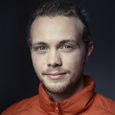In one of the rooms on the RIT Kosovo campus near Germia park, a class of adults, ranging from young to middle-aged, are standing in a circle. Led by a small handful of leaders, they are engaging in a strange ritual.
The rules are unclear. One after the other, the participants call out to each other, while apparently trying not to succumb to laughter. Those who fail, one after another, begin to jump and dance, until every person has followed suit and everybody is wildly jumping around in circles.
More strange scenes follow, including drawing sessions, jumping back and forth over a line on the ground in response to questions of preference, and the entire group walking after one another in circles, with the apparent aim of writing heartfelt messages on sheets of paper taped to their backs.
After around one hour of exercises interrupted by conversations and discussions, everyone sits back down and takes on a more serious face, while one woman from the group — who turns out to be a trainer — speaks up to the few individuals who have led the various processes. Thus begins the debrief.
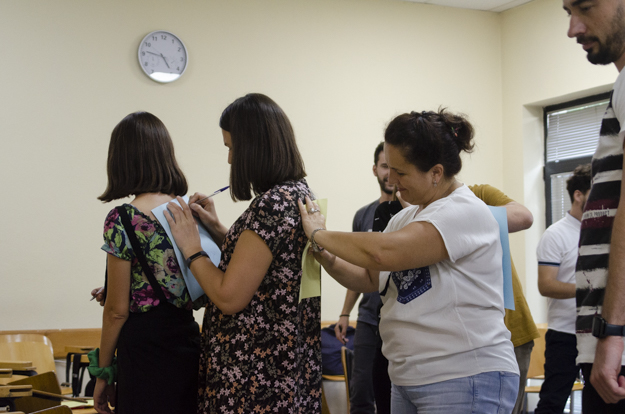
Non-formal education methods tend to look very different from a traditional classroom. Photo: Sindre Langmoen / K2.0.
This was one hour from a training day for future “Superteachers” at TOKA, an organization aiming to empower youth through non-formal learning and learning through volunteer service. Once the training is over, these teachers can become supervisors of individual volunteering groups around Kosovo, themselves led by a pair of young TOKA mentors.
“Supervolunteers” go through a specific year-long curriculum, beginning with team-building and personal development, letting participants bond. Then, they go out into the community, talk to people, assess the needs, and conceptualize concrete projects that they can do for the benefit of the community. After concluding a project, they finish by celebrating their accomplishments — an important element, because realizing that they have achieved something enhances their learning.
Edona Begaj is a physical education teacher from Ferizaj who works in a private school. She was acting as a leader of a group during the “Superteacher” training day, helping to guide a group of peers through the different activities.
This non-formal way of teaching can often lead participants to learn more than at school, according to Begaj. “It is going to be more fun … and at the end they will see that ‘Oh wait, during this time that we really enjoyed, we learned a lot,’” she says.
The exchanges and social nature of activities also lead students to learn about cooperating with each other and to be more patient, helping to foster discussion, openness and better social skills.
Florent Kuçi, soon to be 22, is training to become a “Supermentor.” He began as a camper at the age of 19 at one of TOKA’s regular residential camps for young people out of simple boredom and quickly became immersed. Over a couple of years, he transitioned from camper to junior counselor and then senior counselor. Together with his pair Fjolla, he intends to start his own “Supervolunteer” club in Suhareka, his hometown.
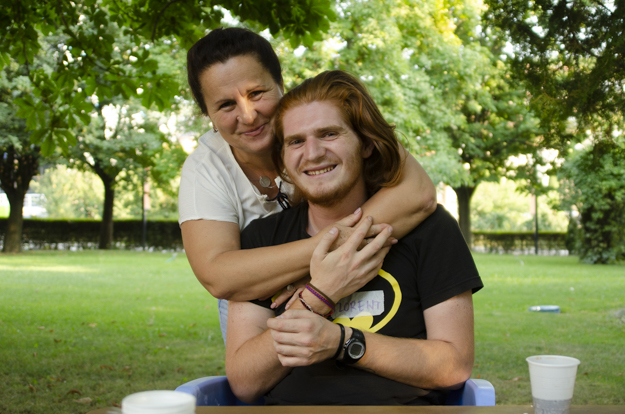
Florent Kuçi says he has benefited a lot from the social skills he learnt as a participant in TOKA’s activities and now wants to pass that experience onto the next generation. Photo: Sindre Langmoen / K2.0.
Florent also emphasizes how formative the experience has been and how much one can learn from it — whether skills useful when looking for employment or practical skills for now or later in life. Various activities, even games, have also helped him to cope with stressful, time-sensitive situations and deadlines, he says.
He believes that the camps have made him much more considerate, and helped him think more critically. He also says he used to be an introvert, but through the camps, he has learnt to voice his opinion and overcome the fear of judgment that had previously led to him keeping quiet.
A central aspect of TOKA’s activities, which participants often lack in other environments, is proper socialization. What Florent loves, is to see the transition that campers go through from the first day to the last day.
“The first day, we have kids who have never been physically close to anyone,” Florent says. “So they wouldn’t even want to shake your hand. But during camp, they would see how people are close to each other, how we give hugs to everyone, and on the last day they leave crying and hugging everyone. And that, to me — that’s a success.”
Soft skills to develop the self
But non-formal education such as that practiced at TOKA is not just some hippie concept for ambitious teenagers — it’s an approach that can be integrated and applied to all walks of life.
Haxhere Zylfiu is a researcher in non-formal education at the Kosovo Pedagogical Institute. Her work is oriented on researching and promoting what she calls life-long learning.
Zylfiu believes that formal education — which has a step-by-step hierarchy to pass from one level to another, and which has some form of official accreditation — is only part of what is needed in order to not only obtain a good job and perform well, but also function and contribute to society and live a good life.
She explains that other countries have understood that. For example, in Germany, businesses and companies invest a lot of money into the development of their workers and not only in the skills directly related to their profession. “If the worker is a cook, [employers provide training] not only about cooking, but also in the soft skills, how to communicate with clients, how to be with colleagues, and so on,” she says.
Such soft skill development should ideally start at an early age, in schools and universities, but Kosovo’s education system has traditionally been much more focussed on simply transmitting knowledge. Meanwhile, it is rare for Kosovar employers to put much focus on the development of such skills in their employees, as it is not seen as an investment that brings about profit or any concrete returns.
With unemployment rates soaring, the workforce is plentiful and cheap, therefore the job market is competitive. If employees do not perform well enough, perhaps because they do not have the required soft skills to function effectively in a work environment, it is easier to simply replace them after a short trial period than to train them, Zylfiu explains.
She also believes that there is a lack of understanding about why there is a need to continuously develop oneself, why graduating from school or university with a diploma should not be seen as the end goal. Zylfiu says that one would be met with bewilderment in Kosovo if they were to advocate further non-formal learning “to someone who has finished for example, matura [high school exams], has a family, has children, if you tried to explain about opportunities for life-long learning, for soft skills.”
This concept, however, is one that is very much in TOKA’s DNA.
In addition to the “Supervolunteers” program, TOKA’s residential camps typically gather around 40 participants from all around Kosovo for one week together in Germia. There, they learn team-building skills and critical thinking skills, sometimes problem solving skills and project management skills — and then there are thematic camps where they learn things like survival skills.
“We don’t intend to produce professionals, we intend to produce decent human beings that can then be decent professionals,” says Renea Behluli, a TOKA project manager who has been involved almost since the organization first started.

One of TOKA’s core ventures is running residential camps for young people, who learn problem solving and critical thinking skills through fun activities. Photo courtesy of TOKA.
Behluli manages another key element of TOKA’s work — the outreach program. These are programs mainly targeting kids and youth from disadvantaged backgrounds with high potential.
The recent Girls Power Up project is one example, where TOKA went to four different municipalities and trained around 350 girls, exclusively from rural high schools, over a period of four months.
After working with the girls on their personal development, critical thinking and problem solving, they followed up with training courses on CV and motivation letter writing, how to behave in an interview and how to present oneself before an audience. Finally, the participants were given the opportunity to explore their talents and interests, and examine what they were good at.
“The underlying component was building resilience and you know, girls in rural areas are usually very disadvantaged and taught to shut up and be obedient and not be independent and work for their own self,” she says.
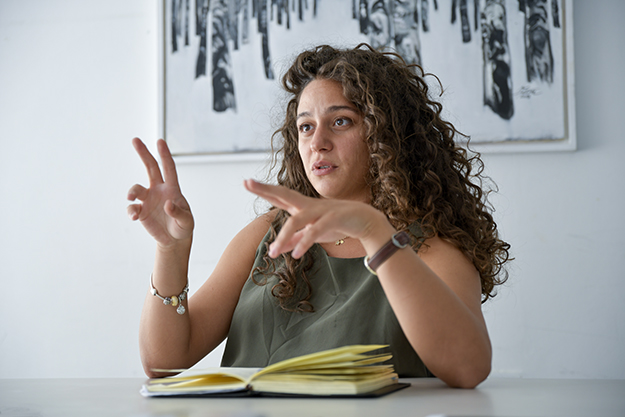
Renea Behluli, a project manager at TOKA, says that their activities are designed so that while young people think they are simply playing games they are learning a lot at the same time. Photo: Atdhe Mulla / K2.0.
Behluli explains that TOKA’s main underlying principle is to empower children and young people to be the best they can be, and teach them how to give back to the community with the skills they’ve learned. The most important element is to provide a safe environment for them to express themselves freely, without being judged and undermined. This is something that generally lacks in the country, she says.
“Youth and kids, even adults, they have to do it and to feel it, so they can learn it and apply it,” Behluli says, explaining why practical learning is so important in addition to theoretical learning.
However, these forms of learning work best by complementing each other. Beyond the volunteering and practical skills, simple exercises they do are useful to bring up the energy in a class, and games can be used to enhance the focus and concentration of kids.
“They think it’s games, they think it’s playing, but they are learning and having the opportunity to be more open to the experiences and learning from them,” Behluli says.
‘First give it to the hand’
Although such hands-on learning methods are far from common place within Kosovo’s schooling system, there are a number of pre-schools that embrace taking an alternative approach to education.
Montessori schools — of which there are several representatives in Kosovo — follow a method of education developed in the early 20th century by an Italian doctor and educator named Maria Montessori, which was based on her scientific observation and work with children. The Montessori method has found widespread success, with perhaps tens of thousands of schools worldwide.
It is a system that places the child in the center of the methodology and follows two basic principles. First, that individuals construct their psychological self and develop themselves through interacting with their environment. Second, that children, in particular those under the age of 6, have an innate path of psychological development and that giving children the liberty to act freely and develop at their own pace leads to optimal development.
The Montessori School of Kosova occupies a couple of floors at the base of a tall building in the Kalabria neighborhood of Prishtina. It looks completely unremarkable from the outside, but once you step inside, you find yourself in a comfortable and cozy space, where everything has been carefully constructed for its primary clientele.

Everything at the Montessori School of Kosova is set up with the child’s development at the center. Photo: Atdhe Mulla / K2.0.
The children have a small, child-sized kitchen and sink, where they serve their own food and wash their own glasses and porcelain dishes — no plastic dishes here: They need to learn how to be careful. Small, round tables with small chairs occupy the room, some plants in a corner, beautiful sunlight and meticulously arranged learning materials all around the room.
The pre-school for 3- to 6-year-olds only has 30 kids, divided into a smaller toddler group and a larger, older group. Despite the vast majority of children being local, the school is bilingual — most of the teaching takes place in English, so the young children grow up knowing two languages.
Adelina Tahiri is headteacher at the Montessori School of Kosova, and has worked there for three years. She explains that the Montessori system emphasizes learning through doing. “Maria Montessori said, if you want to give something to the mind, first give it to the hand,” she quotes.
“Instead of predicting and telling the child what they should learn and how they should learn, in Montessori methodology you follow the child, the most important thing is that you prepare an environment that stimulates them to learn as much as they can,” Tahiri explains.
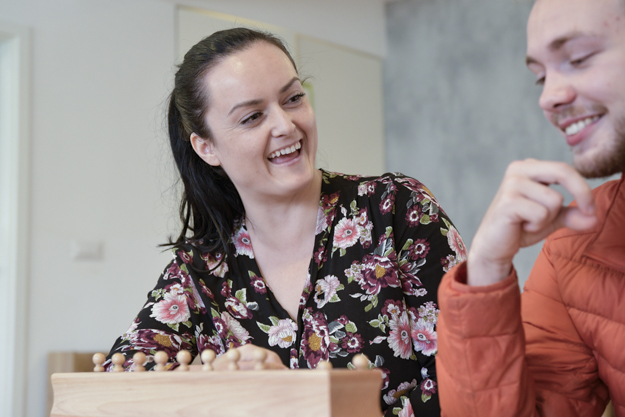
Adelina Tahiri, headteacher at the Montessori School of Kosova, says that a core part of the school’s philosophy is the belief in learning through doing. Photo: Atdhe Mulla / K2.0.
The classrooms are physically divided into five main areas. In the practical life skills corner, children can tie laces, handle zippers and buttons, pour liquids and interact with objects. In the sensorial corner are materials developed to help them strengthen their five senses and help them concentrate.
On one side of the room is the math corner, where there are various materials that help children understand numbers or more abstract math, such as fractions. There is also a cultural area, where they learn about the world they live in, as well as a language area. Beyond this, they have art, sport, music and dancing activities so that the children always have new things to try.
Most activities take place on a one-on-one basis, with a teacher introducing a new material to a child and guiding them in exploring it. At other times, an older child teaches a younger one to do things.
That is why Montessori has mixed-age groups, Tahiri explains. “So that the children can learn from each other — the small child learns from the bigger ones, but also the bigger ones learn how to be mentors, how to take care of someone, so when they grow up, they have this instinct of taking care of someone and teaching something to someone.”
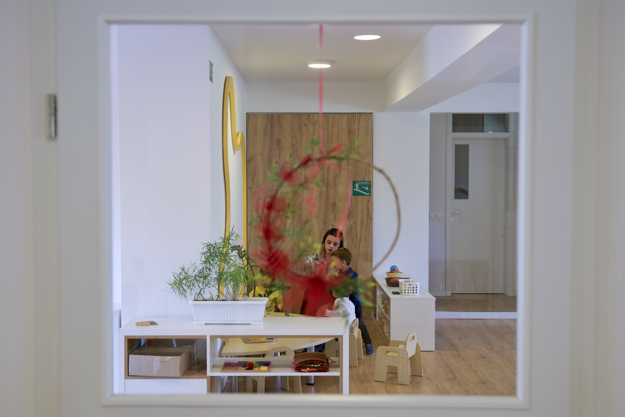
Teachers at the Montessori School of Kosova ensure that children are, as a minimum, up to date with the core curriculum by the time they enter first grade. Photo: Atdhe Mulla / K2.0.
For every child, the teachers have developed a weekly individual plan on what they will work on with them. Every day, Tahiri presents new material to each child in the classroom, all while respecting their pace of learning. She explains that sometimes they have a 4-year-old who can read and write, and sometimes they don’t — but that it isn’t important, as they do not follow age criteria in their teaching.
She contrasts this way of learning to formal schooling, where everyone has the same lesson on the same day, and the next day they move onto a different topic, even if some children are more advanced than the rest or others are still struggling with the previous topic.
Tahiri knows the regular school curriculum and ensures that they have all learned what they need to know when entering the formal school system, while providing them the opportunity to learn more if they can. However, she insists that “Montessori materials get a child more prepared than you can assume a 5-year-old to be when they enter the first grade.”
Children in Kosovo are typically not used to the freedom at Montessori, she says. They tend to have difficulties in fitting in and understanding the limits of their freedom at first, when entering the school. They can walk around freely, choose what to work with, use the floor or the tables. But the Montessori magic works its way with everyone, Tahiri insists.
It’s unlikely that such schools are going to become the norm in Kosovo any time soon; in countries with a much longer tradition of alternative education approaches, specialist schools such as the Montessori School of Kosova are still the exception, rather than the norm.
But there are certainly lessons that can be learnt from different educational methods that can be transferred across into mainstream settings to help improve and enrich the quality of education on offer for all.
There is a need to inform people about opportunities, possibilities and the need for change, says Zylfiu, from the Kosovo Pedagogical Institute. It is not something that can be imposed on people.
“It depends on your willingness to learn and to change yourself and to prepare yourself — to get a job, whether for yourself, for your daily life, for your family,” she says, adding that people need to be convinced of the need to continuously learn, beyond school and university and at any age.
Zylfiu believes that the knock-on benefits of changing the way in which people think about education could be huge for a country like Kosovo where large numbers of young people in particular see their futures elsewhere. She takes her own son as an example, explaining that when asked why he wants to go abroad, he responds that he doesn’t know why or what he’ll find there, but that he knows exactly what he has in Kosovo — no true chance for his development.
“There is a potential, there are a lot of people, a lot of energy in people,” Zylfiu says. “You just need to awaken this motivation and this energy in people.” K
Feature image: Atdhe Mulla / K2.0.
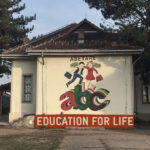
Back to Monograph









